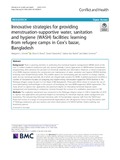| dc.contributor.author | Schmitt, Margaret L. | |
| dc.contributor.author | Wood, Olivia R. | |
| dc.contributor.author | Clatworthy, David | |
| dc.contributor.author | Rashid, Sabina Faiz | |
| dc.contributor.author | Sommer, Marni | |
| dc.date.accessioned | 2022-06-20T09:11:55Z | |
| dc.date.available | 2022-06-20T09:11:55Z | |
| dc.date.copyright | 2021 | |
| dc.date.issued | 2021-02-26 | |
| dc.identifier.citation | Schmitt, M. L., Wood, O. R., Clatworthy, D., Rashid, S. F., & Sommer, M. (2021). Innovative strategies for providing menstruation-supportive water, sanitation and hygiene (WASH) facilities: Learning from refugee camps in Cox’s bazar, Bangladesh. Conflict and Health, 15(1) doi:10.1186/s13031-021-00346-9 | en_US |
| dc.identifier.uri | http://hdl.handle.net/10361/17006 | |
| dc.description | This article was published in the Conflict and Health by BMC [© The Author(s). 2021 Open Access This article is licensed under a Creative Commons Attribution 4.0 International License, which permits use,] and the definite version is available at: https://doi.org/10.1186/s13031-021-00346-9 The Journal's website is at: https://conflictandhealth.biomedcentral.com/articles/10.1186/s13031-021-00346-9 | en_US |
| dc.description.abstract | Background: There is growing attention to addressing the menstrual hygiene management (MHM) needs of the
over 21 million displaced adolescent girls and women globally. Current approaches to MHM-related humanitarian
programming often prioritize the provision of menstrual materials and information. However, a critical component
of an MHM response includes the construction and maintenance of water, sanitation and hygiene (WASH) facilities,
including more female-friendly toilets. This enables spaces for menstruating girls and women to change, dispose,
wash and dry menstrual materials; all of which are integral tasks required for MHM. A global assessment identified a
number of innovations focused on designing and implementing menstruation-supportive WASH facilities in the
Rohingya refugee camps located in Cox’s Bazar (CXB), Bangladesh. These pilot efforts strove to include the use of
more participatory methodologies in the process of developing the new MHM-supportive WASH approaches. This
study aimed to capture new approaches and practical insights on innovating menstrual disposal, waste
management and laundering in emergency contexts through the conduct of a qualitative assessment in CXB.
Methods: The qualitative assessment was conducted in the Rohingya refugee camps in CXB in September of 2019
to capture new approaches and practical insights on innovating for menstrual disposal, waste management and
laundering. This included Key Informant Interviews with 19 humanitarian response staff from the WASH and
Protection sectors of a range of non-governmental organizations and UN agencies; Focus Group Discussions with
47 Rohingya adolescent girls and women; and direct observations of 8 WASH facilities (toilets, bathing, and
laundering spaces).
Results: Key findings included: one, the identification of new female-driven consultation methods aimed at
improving female beneficiary involvement and buy-in during the design and construction phases; two, the design
of new multi-purpose WASH facilities to increase female beneficiary usage; three, new menstrual waste disposal
innovations being piloted in communal and institutional settings, with female users indicating at least initial
acceptability; and four, novel strategies for engaging male beneficiaries in the design of female WASH facilities,
including promoting dialogue to generate buy-in regarding the importance of these facilities and debate about
their placement.
Conclusions: Although the identified innovative participatory methodologies and design approaches are
promising, the long term viability of the facilities, including plans to expand them, may be dependent on the
continued engagement of girls and women, and the availability of resources. | |
| dc.language.iso | en_US | en_US |
| dc.publisher | BMC | en_US |
| dc.relation.uri | https://conflictandhealth.biomedcentral.com/articles/10.1186/s13031-021-00346-9 | |
| dc.subject | Innovative strategies | en_US |
| dc.subject | Menstruation-supportive water | en_US |
| dc.subject | Sanitation and hygiene (WASH) facilities | en_US |
| dc.subject | Refugee camps in Cox’s bazar | en_US |
| dc.subject | Bangladesh | en_US |
| dc.title | Innovative strategies for providing menstruation-supportive water, sanitation and hygiene (WASH) facilities: Learning from refugee camps in Cox’s bazar, Bangladesh | en_US |
| dc.type | Thesis | en_US |
| dc.description.version | Published | |
| dc.contributor.department | Brac James P. Grant School of Public Health | |
| dc.identifier.doi | https://doi.org/10.1186/s13031-021-00346-9 | |
| dc.relation.journal | Conflict and Health | |

